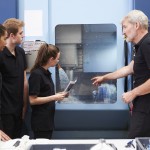Ronald Beghetto wears many others in studying and working to inspire creativity, especially in education. He is one of the speakers at the Creativity Conference at Southern Oregon University August 3-6. And he visits with us about his work on creativity.
They are among 59 students that took part in the Jack Kent Cooke’s Young Scholars program July 7-27, a national scholarship initiative for students in 8th through 12th grade who demonstrate exceptional academic abilities, unique talents, and persistence.
“Each year, I have the opportunity to work with preservice teachers to provide a little bit of information for them about gifted education. During that workshop, someone always brings up the idea that one great way to work with advanced learners – particularly the teacher pleasers and ‘fast finishers’ among them – is to have them help the other kids with their work. These developing professionals, along with some of the practicing teachers with whom they work, are secure in their belief that this approach is a win for everyone. Students are kept busy, the struggling student has individual support, and surely the gifted learner will benefit because “we all learn something better when we have to teach it to others,” writes Catherine Little, a professor of educational psychology at UConn’s Neag School of Education.
According to the American Psychological Association (APA), school psychology has “…evolved as a specialty area with core knowledge rooted in psychology and education.” Graduate students who choose to become school psychologists have two certification options, according to Sandra M. Chafouleas, Ph.D.
Undocumented children and families face unique challenges that can affect their schooling experience and require the attention and care of educators. Chelsea Connery ’13 (ED), ’14 MA, a former public school teacher and now a Neag School doctoral student in the Learning, Leadership, and Education Policy program, prepared the following issue brief — in affiliation with the Center for Education Policy Analysis (CEPA) — about the impact of undocumented status on children’s learning.
Alexandra Lamb, a doctoral candidate in the Learning, Leadership, and Education Policy program at the Neag School, prepared the following issue brief — in affiliation with the Center for Education Policy Analysis (CEPA) — about school districts that are introducing technology into classrooms through what are known as 1:1 programs.
Samuel J. Kamin, a doctoral student in the Learning, Leadership, and Education Policy program at the Neag School, prepared this issue brief on career and technical education in affiliation with the Center for Education Policy Analysis (CEPA).
Neag School graduates from the Class of 2018 share insights into their most memorable UConn experiences — from Education Abroad to internships and more.
On March 20, 2018, U.S. News released their rankings for best public graduate schools of education for 2019, placing UConn’s Neag School at number 17. This ranking is not exactly unexpected, as Neag has consistently placed within the top 20 schools for the past three years.
CT Post (U.S. News lists Neag School as granting highest-ranked graduate degree in education in the state)




